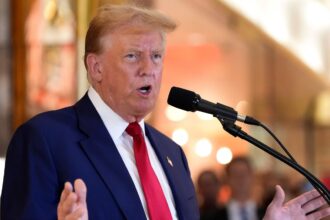The cost of Apple’s next flagship smartphone could triple to over R66,500 following President Donald Trump’s sweeping “Liberation Day” tariffs, a major policy shift that could disrupt the global tech market and hit South African consumers hard.
According to analyst Wayne Lam from TechInsights, the cost of manufacturing an iPhone in China — Apple’s main production hub — is projected to rise from approximately R11,000 to R16,000 due to a new 54% import tariff.
iPhone Prices Set to Triple
The iPhone 16 Pro (256GB) currently retails for around R20,900 in South Africa. But with the added production costs, Wedbush Securities analyst Dan Ives warns the price could jump to an eye-watering R66,500.
“There’s no feasible way to absorb that kind of cost without pushing it onto the consumer,” said Ives. “This would be unprecedented.”
The increase is being driven by Trump’s push to bring tech manufacturing back to the U.S. — a goal many in the industry say is unrealistic and unaffordable.
Why Building iPhones in the U.S. Doesn’t Work
Currently, assembling an iPhone in China costs around R570. If that process moved to the U.S., the cost could increase tenfold — pushing it over R5,700, Lam explained.
“Relocating production to America would be a massive, mammoth undertaking,” said Barton Crockett, senior analyst at Rosenblatt Securities. “It’s not clear you can make a competitively priced smartphone locally.”
Even if manufacturing shifts, Apple still relies heavily on imported components, meaning tariffs would still apply.
Global Trade Fallout
Trump’s “Liberation Day” tariffs include a minimum 10% tax on all imports into the U.S., effective 9 April, with 90+ countries facing additional reciprocal tariffs. These are custom-calculated based on bilateral trade deficits.
In response, China announced a matching 34% tariff on all U.S. imports, escalating the standoff. The Chinese tariff kicks in on 10 April, directly responding to Trump’s reciprocal tax.
“This is not yet a full-blown trade war, but it’s a clear escalation,” said Craig Singleton, senior China fellow at the Foundation for Defense of Democracies. “Each side is hitting back harder.”
Apple Keeping Quiet
Apple has declined to comment on potential price changes. Internally, the company is said to be exploring alternative production sites in India, Vietnam, and Brazil. However, none of these countries currently offer the scale or efficiency of Apple’s long-standing Chinese operations.
Key Takeaways:
- iPhone 16 Pro prices could climb to R66,500 due to new U.S. import tariffs.
- Production costs expected to rise by over R5,000 per unit.
- Apple’s China-based supply chain is directly in the firing line.
- South African consumers could be hardest hit by the global tech ripple effects.
- China’s retaliatory tariffs signal deepening trade tensions.












